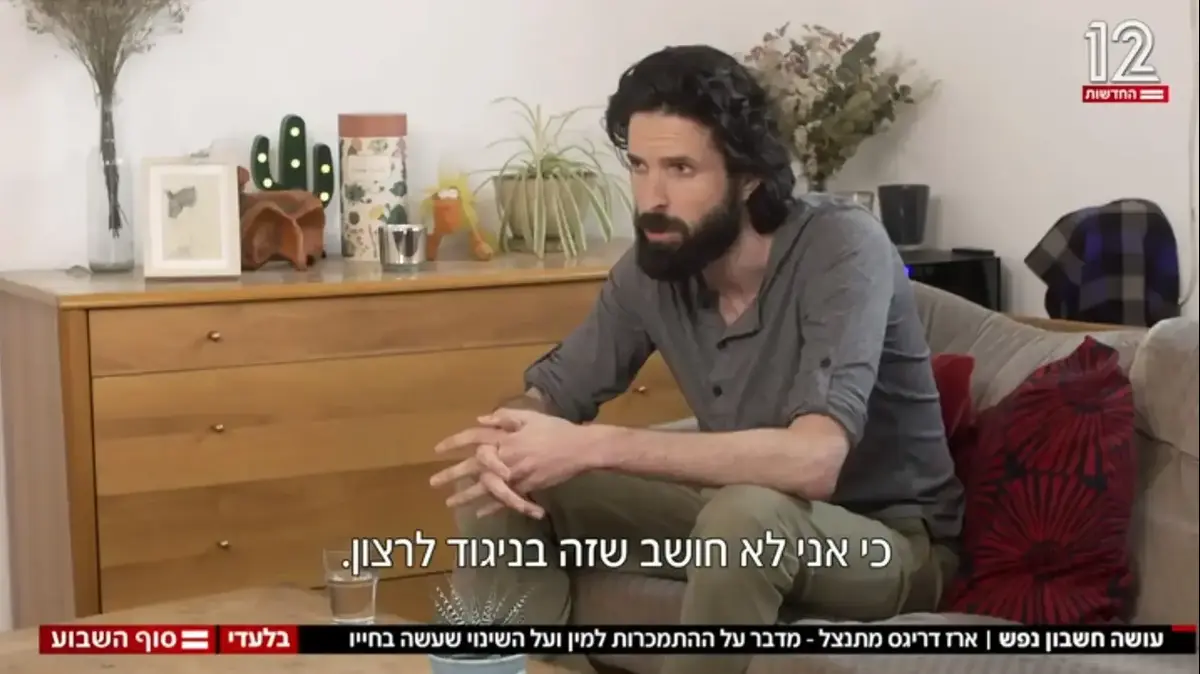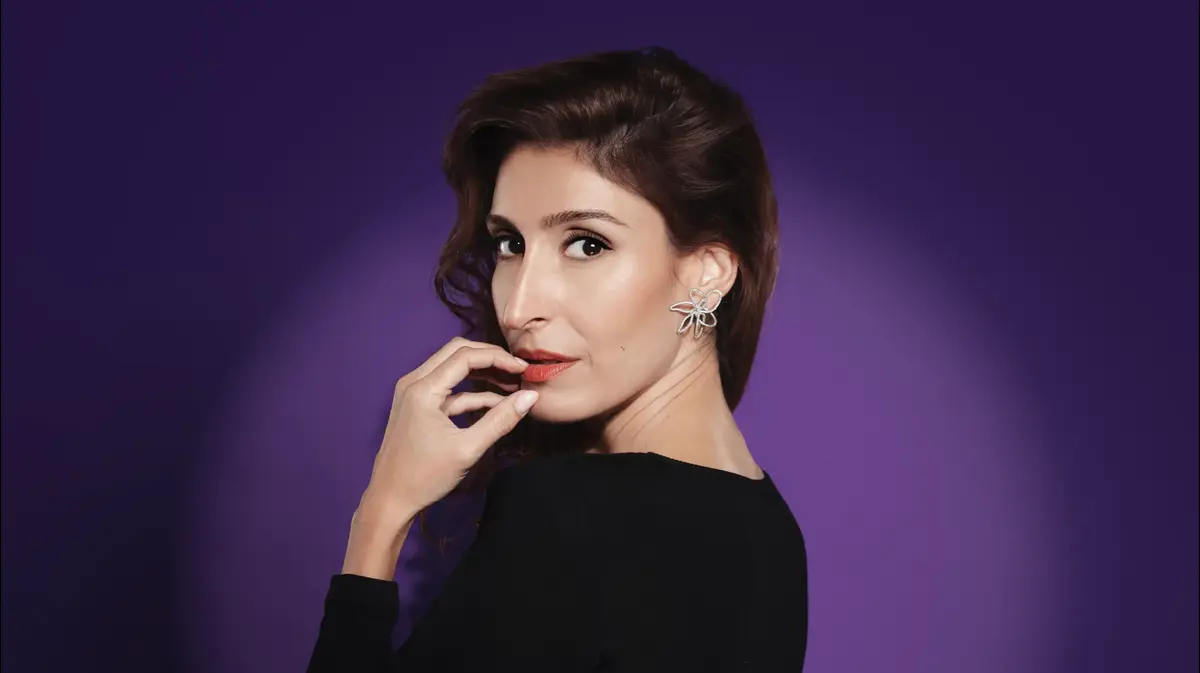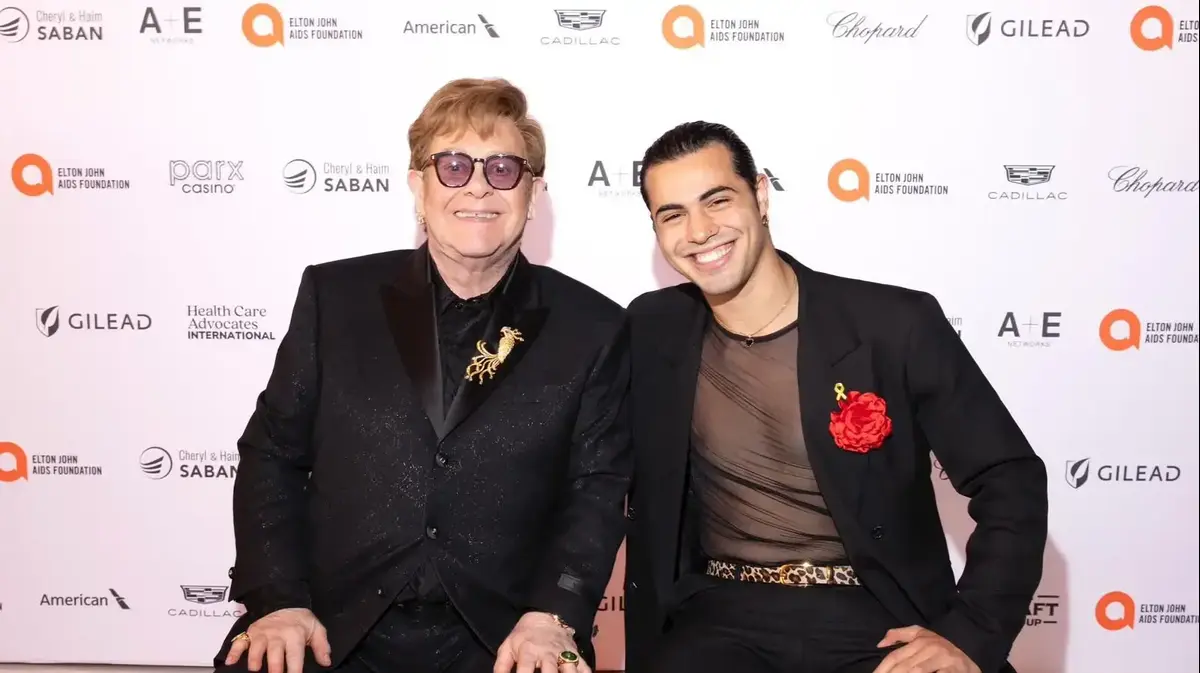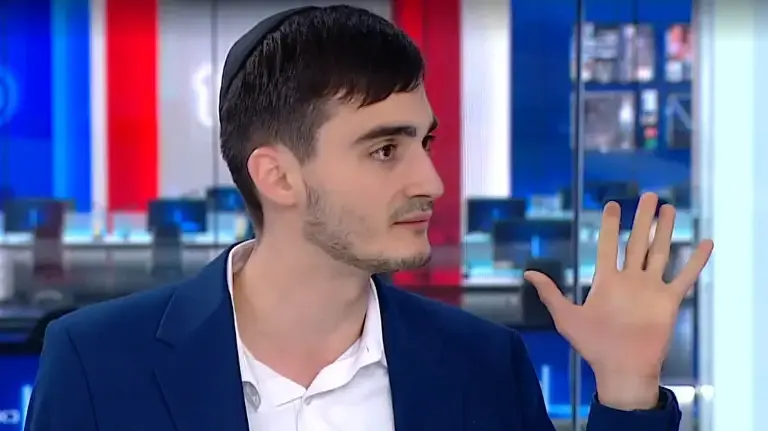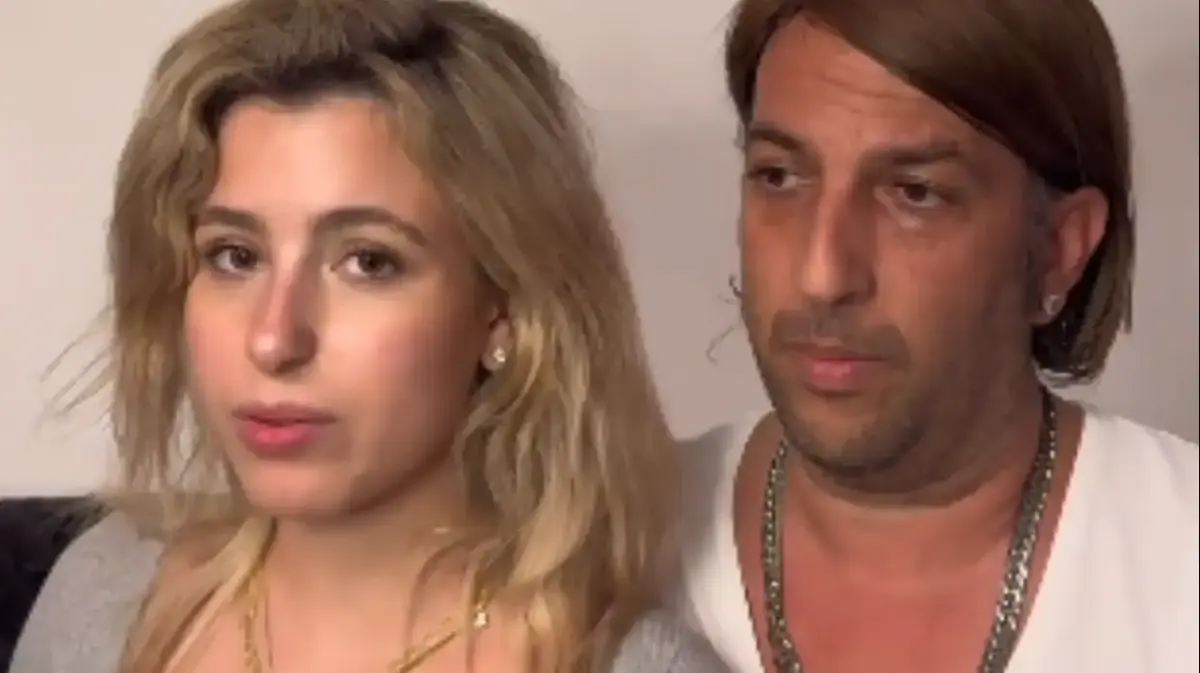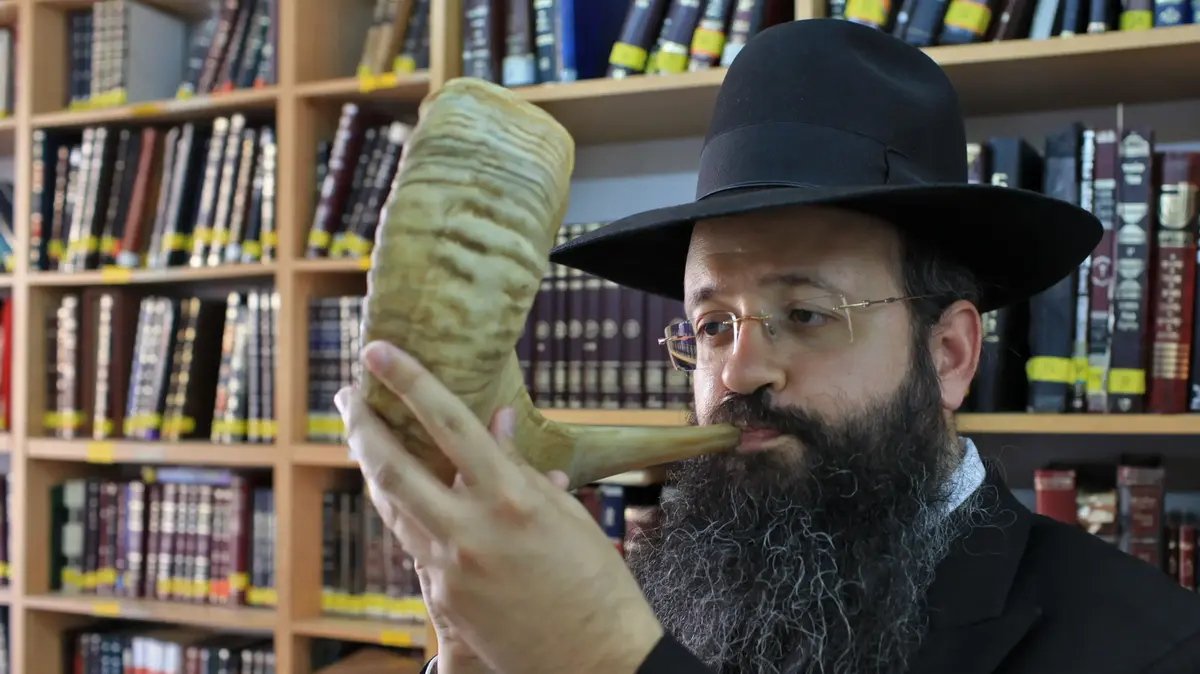culture
TV
TV review
Erez Driggs takes responsibility.
And it's beautiful.
really.
But he apologizes to the wrong people
Women get the nickname "brave" when they complain about sexual assault, men get the nickname "brave" when they take responsibility for inappropriate behavior.
This is a sickening reality.
Erez Driggs came to an interview with Dana Weiss yesterday with the intention of apologizing, but it is not certain that he himself understood what he was apologizing for, or to whom
Tags
Erez Driggs
Living Room Fellow
Sunday, 07 March 2021, 07:27 Updated: 07:28
Share on Facebook
Share on WhatsApp
Share on general
Share on general
Share on Twitter
Share on Email
0 comments
If it was not against their will, then what exactly are you apologizing for?
Erez Driggs in an interview with News 12 (Photo: screenshot, News 12)
"We already know what he's going to say. He will admit to everything that has been published, and nothing else. He will pull out his poor show, and everyone will feel sorry for him. He will talk about his addictions, about the terrible entertainment industry. He will say he has changed and he is no longer who Was".
With these words, Bojek Horsman's best friend explains why she would not watch his responsibility-taking interview on television.
It looks like the Netflix masterpiece (selected for Walla! Culture's previous decade series) foresaw Erez Driggs' interview last night.
But this was not a self-fulfilling prophecy, but a sharp observation of our sickening reality.
Women get the nickname "brave" when they complain about sexual assault, men get the nickname "brave" when they take responsibility for inappropriate behavior.
Not infrequently they also receive applause.
The network exploded yesterday with applause, which is understandable.
Erez Driggs takes responsibility.
That's great.
This is important for the public discourse around such behaviors.
This is important for complainants, who rarely get to hear the man who hurt them apologize to them Get with and Channel 12. It is also important for a functioning society that needs to maintain proportions and hierarchy of sexual assault.
Between the lines, however, Driggs demands barter in exchange for taking responsibility.
He is willing to admit everything, bear the blame, and pay a personal price - just do not call him a rapist.
Right, he really did not rape.
Nor is he charged with bribery, fraud and breach of trust.
Branding is important, and he understands it, so he also demands that we stop saying that there was a power relationship, a slightly more controversial matter.
But we nod because we know how critical this responsibility is, probably from a high-profile person.
Then he also demands that it not be alleged on the 17th Saturday that he wrote to her that she would "only gain" if he raped her she is a minor.
Because the law says so.
Slowly the picture becomes clearer, and we realize that we are not really in a press interview, but in a kind of negotiation to clear Erez Driggs' name.
More on Walla!
"Moshe Ivgi's conduct has been systematic for decades. I believe in his victims."
To the full article
Dana Weiss refers to Erez Driggs' hair.
Strange choice in light of the circumstances of the interview (Photo: screenshot, News 12)
Writer Margaret Atwood argued that men are afraid that women will laugh at them, while women are afraid that men will kill them.
Erez Driggs is not a murderer as he is not a rapist, but he does get into the tape cast of the powerful man who is unaware of his strength.
If he does not understand the power gap between a 29-year-old theater teacher and a high school student majoring in theater, how can one even talk about the power relations inherent in Israeli society (and in general) between men and women?
Is Erez Driggs at all aware of the privilege he has, which causes him to utter a sentence like "I do not think the correspondence was against the wishes of some of the women."
Wait, if these correspondences were not made against their will, then what are we talking about exactly?
What are you apologizing for?
And most importantly, to whom?
Dana Weiss contained Driggs' apology, though she was not the one to apologize to her.
There are injured women in this story whose voice was not heard yesterday in a 22-minute article in Israel's main news program.
They were not asked for a response, they were not given a stage.
Women who deserved to be apologized to directly, without image and crisis management consultants, who at the flick of an editorial decision became statistics in the atonement of the man who harmed them.
How did it happen that the offender wins a long article in the important news company in Israel, while the victims are left with as much quality research as there is on a feminist niche site?
Driggs' apology is sincere, his exposure is not obvious and his openness about his actions and motives is fascinating.
This is an important and complex discussion within a topic that often receives sucky media coverage.
His speech is eloquent and he is very convincing, and very believable.
Still, being persuasive and trustworthy is his job.
And yet, Driggs' line of defense is pretty crisp.
There is no doubt that the addiction caused Driggs quite a bit of pain and led him in a bad way.
It is easy to feel empathy for him, it is human, but one must remember that addiction in itself does not justify harming others.
The attempt to frame Driggs' conduct as a side effect of sex addiction is sinful not only to women affected by Driggs, but to other sex addicts, who are suddenly given the media image of sexual predators.
It is important to mention, not all sex addicts send disturbing and obsessive messages to high school girls.
In addition, Channel 13 reporter Neria Krauss mentioned on Twitter that despite Driggs' claims that he has been treating his addiction for four years, one of the testimonies published on her channel is from two years ago.
Was cuter than Erez's character?
Itai Turgeman as Ofer in "Rehearsals" (Photo: screenshot, here 11)
In the end, Driggs' presence in front of the cameras is very important.
His decision not to disappear for a year, Louis CK-style, is not simple in the current climate.
It's to his credit.
The MeToo revolution continues to redefine the place of women in discourse, while most men still do not understand what they are supposed to do other than bow their heads and be ashamed of the thousands of years of oppression of their fathers.
A real change towards recovery will come precisely from complex cases like that of Driggs, with a real discussion of the meaning of power relations, taking responsibility and the public ability to forgive.
The decision to neutralize in advance the understanding that on the scale of sexual assault Driggs is at the other end of the spectrum is important not only to protect the name of the creator of "rehearsals", but to be able to honestly talk about why these behaviors are so problematic and must go out of the world.
The question is whether the parties can lay down their swords for a moment, stop ruling decisively and radically, and most importantly start to be a little more attentive to each other.
Men will have to understand that women are tired of being treated like an object, and women will have to believe men who want to go through a process of change.
There is an apology and taking value responsibility, now all that is left is for Driggs to do the right thing in front of the complainants themselves.
If the women he hurt can forgive him, we too can do it, and along the way we can also open a new page in front of his work.
Pop up, look, our own utopia.
In small
In parallel with the long article about Driggs, Hila Korach's article about the situation of women in the local music industry was broadcast on Channel 13's competitors.
At the center of the article were Neta Barzilai, Keren Peles, Doron Talmon, Nasrin Kadri and Eden Darso, who together recorded a new song for the advancement of women in a field dominated by men.
The article included some depressing facts reminiscent of how much more work there is until we reach gender equality, even in the arts.
Only a quarter of the musical work in Israel is written and performed by women.
Only 20 percent of the clips viewed on YouTube are made by women.
It is difficult not to connect the dots between the two articles that are broadcast simultaneously.
This imbalance is a very fertile ground for all MeToo ailments.
Peles explains that the collaboration came out of a desire to inspire.
"I wanted to be Naomi Shemer. Now, if it weren't for Naomi Shemer, I could not want to be Naomi Shemer, so maybe what we can do is be someone that someone would want to be," she concludes simply.
One can only hope that little girls will want to grow up to be talented musicians like Naomi Shemer, and little boys will want to grow up and be brilliant screenwriters like Erez Driggs - but that their generation will already grow into a healthier society where women's exclusion and smallness will become a thing of the past.
Share on Facebook
Share on WhatsApp
Share on general
Share on general
Share on Twitter
Share on Email
0 comments

